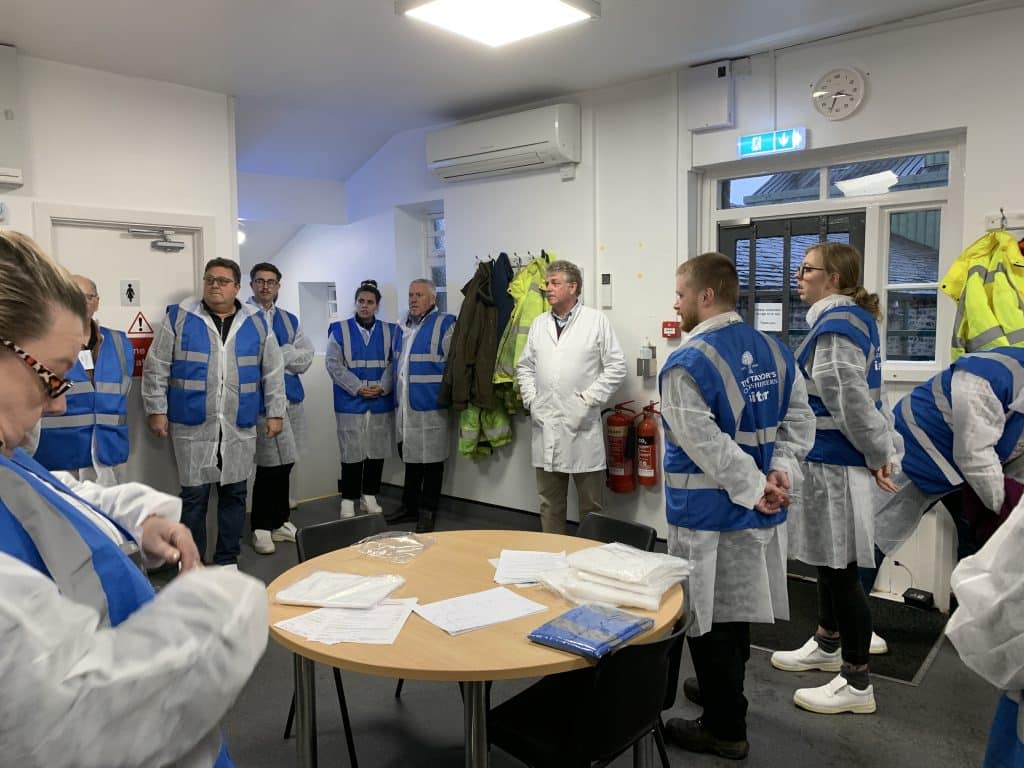Established in 1858 on Cook Lane, Keighley, Timothy Taylor’s brewery moved to its current greenfield (as it was then) site in 1863, making use of the natural springs from which all their beers are brewed via the 30m deep borehole.
1911 saw the brewery extend and in 1991 the “new” brewhouse sourced from Oldham Brewery was installed.
Our tour was back to front, starting in the packaging area with the 2013 Microdat built cask set up. De-bunging up to 360 casks/hour via the two twin head stations, the brewery has been able to move away from manually removing 1,000 + shives to between 50-100. This ensures that time is given to sorting out “foreign” casks prior to washing.
The 13 station 335 casks/hour cask washing machine incorporates three course washes, four intermediate washes and three hot washes, together with a final steam injection. Every litre of water is used at least three times and no detergent added.
The inside of every cask is inspected, optically sorted and new keystones and labels applied. The automatic keystone press ensuring a consistency of process.
Beer from the 27 fermentation tanks (7 of these used as maturation vessels) fills the 45,000 – 50,000 cask fleet via the Esau Huber cask filler. Finings are dosed inline at 3.2 parts/barrel as beer moves from the buffer tank to the cask.
Casks are pressurised using sterile air, meter filled bottom to top to ensure less fob generation (any fob is recirculated via the fob lantern) at a rate of up to 300 casks/hour.
The filling system is cleaned using an automated CIP system.
Once filled, casks are palletised, correctly oriented, tested for leaks and moved to the distribution centre sited half a mile away.
Moving to the production area, the spring water is filled into the three 180 barrel tanks, heated by internal steam coils, treated traditionally (not wanting to risk ion exchange within soft spring water) ensuring calcium carbonate is driven off before being used as liquor in the brewing process.
Malt, sourced from Simpsons and Thomas Fawcett, is held in the four 25 tonne silos (a standard charge of Landlord is 5.5tonnes). Only Golden Promise barley is used, grown predominantly in Northumbria/Fife areas, as it works well with the yeast (see more about the yeast later).
The two Porteus malt mills take between one and a half and two hours to mill the malt ready for the mash tun, which can mash up to 75 barrels.
Mashing in takes place in the “old brewhouse” (installed in the 1970s) – four and a half hours at 65.5 degrees. The mash then stands for an hour after which the mash is underlet with a further five barrels of hot liquor, let stand for a further hour and sparged, giving a cycle time of around seven hours and capacity of up to three mashes/day.
Timothy Taylor’s only uses whole leaf hops. Mostly Goldings, Fuggles and Savinjsky Goldings, with Minstrel, Jester/Ernest and UK grown Cascade/Chinook adding a contemporary edge.
Moving on in the process, we passed the Alfa Laval wort heat exchanger where the wort is run from the hop back to the fermentation vessels (a mix of traditional Yorkshire squares and more modern FVs with lowerable hoods, manufactured by Bibbys of Halifax).
Yeast (originating from Oldham Brewery 44 years ago) is pitched directly into the open squares and left to ferment for three to five days at 67.5oF. Traditional attemperation was manual but around five years ago an automated PLC system was incorporated, improving the repeatability of the fermentation time and consistency of brew.
The yeast, with its unique clean, crisp flavour profile of raisins and salt & pepper on the back note is assessed for viability/vitality, with the most active yeast chosen per brew and acid washed every four weeks. It is stored in two places and DNA fingerprinted every year.
The brewery’s pilot plant, built and installed in 2016 by Johnson Brewing Design has a five barrel brew length and was designed to mirror, as much as possible, the main plant.
The laboratory is situated on the footprint of the original Landlord FV, with the ability to test for ABV, colour, bitterness, micro yeast count and finings trials.
Our tour ended at this point, with a buffet and pint hosted at Taylor’s on the Green in Keighley (I highly recommend the pub, it acts as Taylor’s brewery tap and the buffet was great!). A fantastic tour, showcasing the best of tradition and contemporary practices (to ensure the best of tradition is retained).
We cannot thank Andy, Nick and Tom enough for their time, expertise and hospitality!





